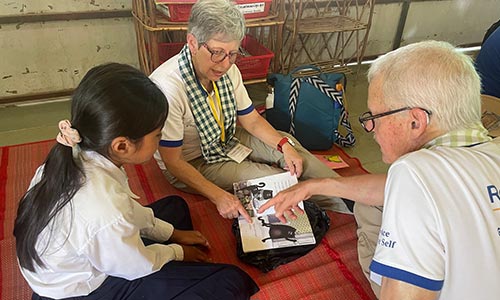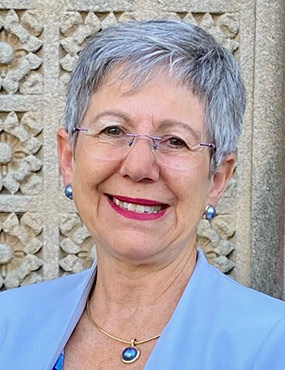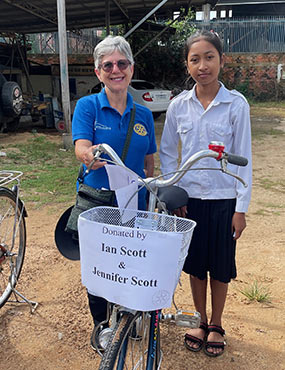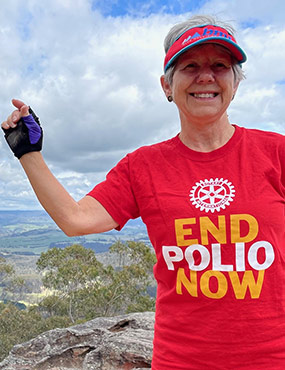Creating a more peaceful world
It’s true, peace starts at home – and in your local community. But it can also take you around the world.

For Jennifer Scott AM, a lawyer and mediator in environmental law, ecological sustainability and conflict resolution, it has also seen her involved in the Kyoto Protocol and the worldwide eradication of polio.
It all began with a chance decision to join the first cohort to undertake a Bachelor of Law at Macquarie University in 1975. Followed by a Master in Environmental Law, Ms Scott says the ethos that underpinned her law studies at Macquarie continues to inspire her to this day.
 Jennifer Scott AM has fond memories of her time as an undergraduate at Macquarie University in the mid-1970s. From the fun of orientation week and wine and cheese nights to the kindness of the campus doctor who was ‘brilliant at making sure students took care of themselves’, it was the atmosphere of this fresh, young university and the attitude of her lecturers and the law faculty that stays with her.
Jennifer Scott AM has fond memories of her time as an undergraduate at Macquarie University in the mid-1970s. From the fun of orientation week and wine and cheese nights to the kindness of the campus doctor who was ‘brilliant at making sure students took care of themselves’, it was the atmosphere of this fresh, young university and the attitude of her lecturers and the law faculty that stays with her.
Initially enrolled in an education degree thanks to a teaching scholarship, Ms Scott was drawn to Macquarie because the course included special education, an area she’d become interested in when volunteering with the Rotary high school program Interact at the Northcott School, working with children with disabilities. ‘It was quite rare at the time for a university to offer special education,’ she remembers.
But, in early 1974, chance would lead her down an entirely different path. It was her first year at Macquarie, and Gough Whitlam had just made higher education accessible for everyone by abolishing fees. Change was in the air, and by coincidence someone mentioned to Ms Scott that they were applying for the Macquarie Law School, which was starting the following year.
‘I’d been very focused on justice at high school, and involved in debating and human rights, so quickly applied,’ Ms Scott says, noting that even as a child she was focused on right and wrong. Her uncle, Sir William Kearney, who had been a supreme court judge in Papua New Guinea for many years and then the Northern Territory working on land rights cases, also influenced her. ‘I noticed he had a very gentle, questioning way – for a judge, he didn’t come across as judgmental at all. I loved listening to him talk about making decisions in very hard circumstances,’ she reflects.
And so it was that the threads that would become her life’s work slowly started to come together. ‘I continued studying education as part of my degree, and while I decided not to pursue teaching, I eventually ran courses on law or related subjects, as well as conflict resolution and mediation.
‘I also did some psychology subjects – it was interesting because we couldn’t do straight law like at other universities at the time, we had to do arts law. Macquarie wanted us to have a broad understanding of the world, which also meant we were more mature by the time we finished.’
The cohort was dynamic too, thanks to the opening up of higher education. ‘It was very different to previous years,’ she recalls. ‘My first year of law was not just made up of people like me, straight out of school, but there were people in their 30s, 40s and 50s, in particular women and mothers who could never have afforded to go to uni otherwise. It was an unbelievable opportunity for mature-age students.
‘They always did well, and I remember they saw all shades of grey, while those of us who were about 19 or 20 probably saw the world as a little more black and white. And they came from such different backgrounds - one had been a registrar in a country town and another, I remember, was a vet. And we had the cohort doing the Bachelor of Legal Studies too, so it was very diverse.’
Interestingly, she also remembers the Sydney Nolan paintings in the original library. ‘They had the Ned Kelly series, which was fabulous as you were walking up, and of course, there was Macquarie Legal Aid, which the law students set up and ran. It was a small university at the time, with only about 130 students in the law school.
‘We received wonderful attention, and there was such an importance placed on your obligation to society – the law professors were focused on looking at societal issues, and were all so caring and deeply philosophical in their approach to law. It was about more than just passing your subjects; it was about real understanding and giving back through law.’
It was a theme that struck a chord with Ms Scott, one she continued to build upon throughout her career as a lawyer and then solicitor in her own practice. She continued her affiliation with Macquarie too, enrolling in a Master of Law to pursue environmental law, an emerging field she’d started working in. ‘It was fabulous,’ she says, and indeed it set her on a new track – one that would take her to Japan.
As she explains, ‘I was approached to work for Robert Hill, who at the time was the leader of the government in the senate and the minister for environment, and became his advisor on brown issues – climate change, packaging, vehicles, pollution issues. That’s how I ended up in Kyoto.
‘I had to put my masters on hold because I was researching climate-change negotiations and couldn’t do that while I worked for the minister – I was too close to the action. But I loved doing my master’s. The tutors at Macquarie were well known in the field and groundbreakers in environmental law. Some of them became judges; they were excellent.’
It’s hard to encapsulate the varied and impactful career Ms Scott has enjoyed in a few words, but whether it was looking at the needs of isolated women in the Gippsland area, championing diversity, equity and inclusion, advising on environmental law or making strides in mediation, it all fits within what she describes as practical peace-building.
 ‘When people talk about peace, they think it’s the absence of conflict. But I look at peace as the absence of want or need. If you go back to Maslow’s hierarchy, how can you be at peace if you have nowhere to stay at night, like kids on the street or refugees with no shelter, living in fear?
‘When people talk about peace, they think it’s the absence of conflict. But I look at peace as the absence of want or need. If you go back to Maslow’s hierarchy, how can you be at peace if you have nowhere to stay at night, like kids on the street or refugees with no shelter, living in fear?
‘You need to work on those things first in order to help people be at peace – once you feel safe, have sufficient food and a basic education, then you have the capacity to work and earn an income – that’s when you’re on the road to peace.’
And it has been this understanding that has been a guiding light for Ms Scott. ‘It began with mediation, actually,’ she says. ‘In about 1990, the Law Society of New South Wales put a call out for people who wanted to be trained in mediation because it was taking seven years for cases to get through the courts.
‘So, I put my hand up and was part of Settlement Week. I did that for quite some years, working with leading dispute resolution lawyers, helping settle cases and solve conflict, and that’s how I became a mediator.’
It was around this time that Ms Scott realised that ‘litigation is a very blunt instrument. As a lawyer, I started looking at things differently and asking clients, “If I could wave a magic wand and the dispute was over, what would that look like?” A lot of the time, they simply wanted the problem solved.
‘So, I started to see my role as more of a problem-solver, and came to understand what creates conflict, how to develop good conflict mechanisms, and even how to prevent conflict. Because conflict is neither good nor bad – you need conflict to question things – it’s just how you manage it. And that’s how I started unravelling conflict, moving from what I call negative peace to working toward positive peace, which doesn’t get a lot of airtime because things are going well.’
Of course, an intrinsic part of the process is listening to others tell their story, something she first did as a child, hearing her parents’ stories of the Troubles in Northern Ireland, and the unrest in Egypt after nationalisation. And it has since led her to being party to conversations all around the world as a volunteer, a delegate at conferences and a committee member. From facilitating conflict management skills in Mongolia to listening to a Hutu and a Tutsi sharing their experiences after the Rwanda conflict, Ms Scott says, ‘Storytelling is an important part of peace-building, even if they’re painful stories – it’s all about the power of forgiveness and reconciliation.’
Unsurprisingly, Ms Scott’s peace-building dovetails seamlessly with her dedication to her community through a range of organisations, and especially her tireless work with Rotary, for which she received the Order of Australia in 2023. ‘It was partly in recognition of my work taking a volunteer team to Mongolia to upskill local judges and social workers,’ she says, ‘and training Rotarians from 160 different countries around the world about peace, mediation and conflict management.’
But speaking with Ms Scott, you realise this only skims the surface of her incredible depth of experience with Rotary, furthering the tenets of international goodwill and understanding, which also includes, as but one example, volunteering in India to help with a National Immunisation Day, where she helped vaccinate 45 million children under the age of five in a week.
 ‘We’ve been working on polio eradication since the 1980s,’ she enthuses. ‘There were 385,000 cases and only two this year so far. By the end of next year, we’ll have hopefully eradicated polio from the world. That’s the power of Rotary,’ she says, and you can just faintly hear a humble sense of pride in the incredible projects she’s been part of.
‘We’ve been working on polio eradication since the 1980s,’ she enthuses. ‘There were 385,000 cases and only two this year so far. By the end of next year, we’ll have hopefully eradicated polio from the world. That’s the power of Rotary,’ she says, and you can just faintly hear a humble sense of pride in the incredible projects she’s been part of.
The Order of Australia also recognised her volunteer work with various charities and not-for-profits, such as her board work with Sustainable Cambodia and Varuna, the National Writers House, which she says was exciting for the diverse thinking of the board and the range of writers’ residencies in Australia and overseas. ‘I’m also on the local Bendigo Bank Board,’ she adds, ‘which is different to every other bank in Australia because we give 85% of our profits back to the community in grants.’
It always comes back to community for Ms Scott and, by extension, her obligation to society. ‘If you wish to live in the society you want, you have to be prepared to build it,’ she says pragmatically, and that’s what she has mindfully done and continues to do by generously sharing her skills and knowledge.
‘Education is such a gift,’ she says. ‘I was lucky to receive a free education, and I know students now don’t, so it’s become a huge investment, but like any investment, you have to make the most of it. Build on that investment, and share your knowledge. Give it away. Many years ago, I heard Bill Gates’s father speak – he was a lawyer, and he talked about giving away your time, talent and treasure; it’s a formula that will change in your life.
‘Maybe, as a student, you’re just picking up on your talent and have little treasure, so give away your time. Later, you might have less time but can give of your talent – so, in Rotary, we have doctors who volunteer in the Pacific every year to train other doctors and nurses, for example. And then, further in your career, maybe you don’t have much time but you might be quite well off, so you can give money instead, or support a scholarship, or fund a worthy cause.
‘So that formula of giving your time, talent and treasure is how you build your community. The percentages will change depending on where you are in your journey, but you can always do something. You might not be able to save the world, but you can make a difference to one person or a community.’
Bio
As a lawyer and mediator focusing on environmental law, ecological sustainability and conflict resolution, Jennifer Scott AM holds a Bachelor of Arts/Law and a Master of Environmental Law from Macquarie University.
As the world trainer for Rotary International, Ms Scott has worked extensively within peace-building and the environment. Her early foray into environmental law and peace-building was as a team member representing Australia at the 1997 climate change conference in Kyoto, where representatives from 198 countries negotiated, adopted and eventually ratified the Kyoto Protocol, calling for the reduction of emissions of six greenhouse gases.
Ms Scott is currently a director nominee for Rotary International, serving from 2025 to 2027. She is also the Chair of the 2024 Singapore International Convention Committee, which has attracted over 13,000 people worldwide. She has served as the moderator of the Rotary International Leadership Assembly and chair of the Rotary International Constitution and By-law Committee. She is a Technical Coordinator for the Rotary Foundation Environment Area of Focus and a member of the Digital Events and Engagement Taskforce, and has led teams of volunteers to train community leaders in peace-building in Cambodia and a vocational training team in Mongolia, upskilling judges and social workers in family mediation and conflict management skills.
Ms Scott is involved in several not-for-profit boards, including Sustainable Cambodia, Varuna, the National Writers’ House, and the Upper Blue Mountains Bendigo Bank. She is a member and former president of the Women’s Club Sydney, and is a member of Women in Rotary, which is dedicated to achieving equity for women around the world.
She has been awarded the Rotary Foundation’s Citation for Meritorious Service and recently received her Member of the Order of Australia (AM) as part of the Australia Day 2023 Honours list. She was awarded for her significant service to the community through a range of organisations.